Early gut maturation leads to a higher growth
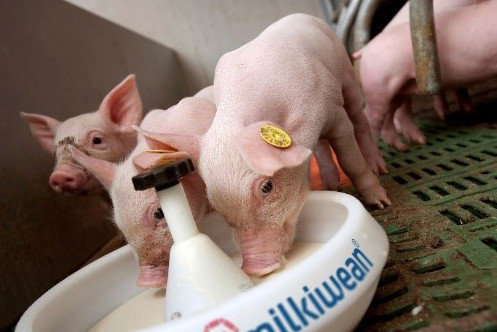
Milkiwean Yoghurt is a nutrient-dense complex milk replacer, providing additional nutrients next to the sow’s milk to help balance the nutritional demands of the young pig. It is unique in composition and contains more than twice the dry matter compared to a regular milk replacer. As a result, piglets have improved energy and dry matter intakes, thus better preparing them for transition to solid feed.
Several field trials have proven the benefits of supplementing Milkiwean Yoghurt next to the sow’s milk during the first 2 weeks of life. Combining a supplement of the yoghurt product with the Milkiwean high quality diets up to 6 weeks of age has an advantage in terms of within-batch homogeneity and body weight gain at the end of the nursery phase and up to slaugh¬ter.
The increase in growth of piglets after 3 weeks of supplementation was confirmed in a study conducted at the Trouw Nutrition Swine Research Centre in collaboration with Wageningen University & Research. Piglets consuming the product next to the sow’s milk, were 510 g (8%) heavier at day 21 (P=0.046) compared to the control group receiving only sow’s milk (Table 1).
Intestinal maturation stimulated
The positive effect on weight gain is probably the consequence of the increased availability of nutrients present in the yoghurt compared to sow’s milk only. In the same study, the intestinal development was analysed in detail. An increase of the length and the weight of the small intestine before weaning was determined in piglets having access to Milkiwean Yoghurt (Figure 1).
Supplementation before weaning resulted in cylindrical growth of the intestine, leading to an elongated gut with a wider diameter. The enlargement of the intestine results in an enlargement of the mucosal surface and thus increased numbers of villi. This enlargement in mucosal surface leads to a more efficient nutrient uptake, driving the observed increased body weight gain before weaning.
Multiple stressors at weaning
Most probably, the observed gut maturity will benefit piglets also at weaning when they are confronted with multiple stressors. Abrupt weaning is associated with low feed intake, causing morphological and histological changes of the small intestine. Looking to the gut structure, the epithelial lining of the small intestine has finger-like projections, known as villi (Figure 2). These villi have an outer layer of specialised cells responsible for the uptake of nutrients. In addition, between the villi, invaginations exist into the intestinal wall, called crypts. Several crypts surround a villus forming a crypt-villus unit. Intestinal stem cells located at the base of each crypt proliferate and migrate to the tip of the villi to become functional.
Figure 2 – The epithelial cells lining the small intestine form finger-like projecting villi that protrude into the lumen. Invaginations known as crypts are located between the villi.

For optimal function of the small intestine, long intact villi are desirable. At weaning, because of the low feed intake and the lack of nutrient supply, villous atrophy occurs and the integrity of the epithelial cell layer is compromised. This villous atrophy is associated with a faster proliferation of intestinal stem cells in crypts leading to deeper crypts.
Benefits felt post-weaning
Although the supplementation of the product had no influence on the villi height, the numerically increased numbers of villi induced by supplementing Milkiwean Yoghurt before weaning will probably remain in the period after weaning, as it also contains milk oligosaccharides that are being absorbed from the small intestine, thereafter entering the blood circulation. As such, serum samples of piglets fed the product contained 3’-sialyllactose (3’-SL) and some neutral oligosaccharides including a galacto-oligosaccharide (GOS) structure. 3’-SL and other oligosaccharides are thought to have significant health benefits for the neonate, because of their roles in supporting gut maturation, and even cognitive development.
Next to their effects on the small intestine, the oligosaccharides and the resistant starch abundant in the yoghurt induced significant changes in quantity and ratios of volatile fatty acids in colonic digesta, such as acetate, propionate and valerate. Improved gastrointestinal functions are associated with these acids.
These recent data show that early supplemental feeding stimulates the young gut to mature. The developed intestine makes the piglet more resistant to later life challenges, not only shortly after birth, but most prominent at weaning. This increases the chance for a healthy and efficient growth in later life.
References available on request.
 Beheer
Beheer
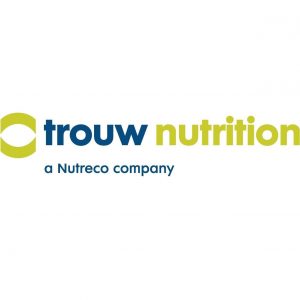

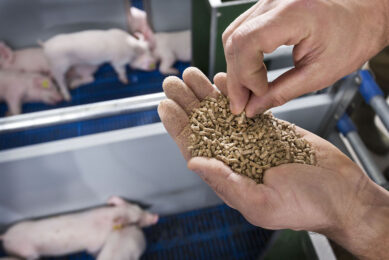
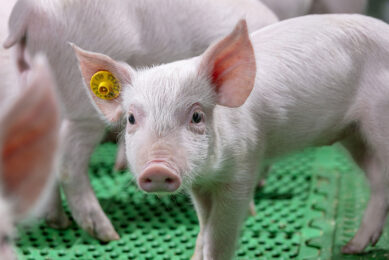
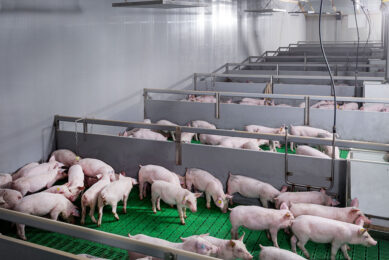
 WP Admin
WP Admin  Bewerk bericht
Bewerk bericht